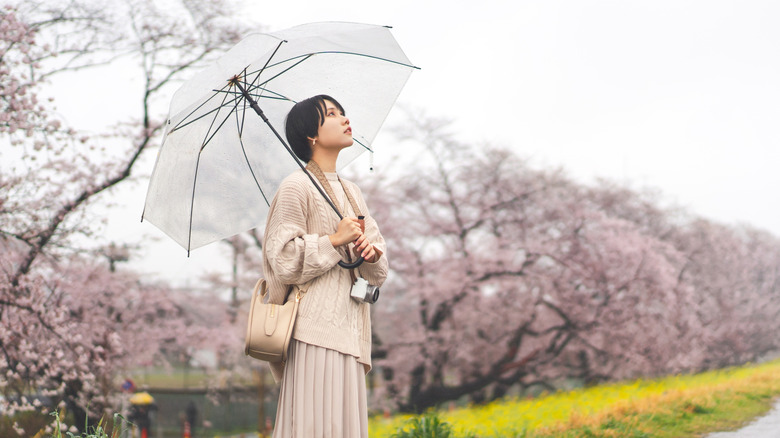Packing This Item For A Tokyo Trip May Be Less Useful For Tourists (And What To Do Instead)
Just a heads up: Tokyo is a pretty rainy city. If you're planning a trip to Japan, prepare yourself for weather. This is a four-season country, with muggy summers and snowy winters, and the capital receives more than 50 inches of rain each year. Granted, the island chain is about 1,900 miles long, which is about the distance from Maine to Florida, so the climate varies quite a bit; but whether you're in chillier Hokkaido or subtropical Okinawa, you can expect a good amount of water to fall from the sky. Rain jackets and water-resistant footwear come strongly recommended, especially in November, the perfect month for budget travelers to visit Japan.
Before you take up valuable space in your luggage, consider leaving the umbrella at home. Folding umbrellas are compact and dependable, and you'll almost certainly need that cloth dome to shield you from the elements. But Tokyo is one destination where you don't necessarily need to bring your own; instead, you can walk into a store and buy yourself a konbini, Japan's budget-friendly umbrella.
"Whenever I travel abroad, I usually pack a small umbrella that folds up compactly in my handbag," writes blogger Alyse, aka The Invisible Tourist. "When packing for Japan however, I don't bring them along because I ALWAYS stock up on umbrellas once I'm there — Japanese umbrellas are honestly the best! The classic clear plastic konbini umbrellas for 500 yen are icons of the rainy summer season, while the 24 prongs in traditional style are very sturdy and durable."
Konbini and Japan's love affair with umbrellas
The Japanese have used various kinds of umbrellas for well over 1,000 years. The traditional wagasa, which was originally fashioned from bamboo and weatherproofed paper, dates back to the eighth century and is considered a hallmark of Japanese society. Even today, Westerners can imagine a geisha strolling through a garden with her decorative parasol. They helped protect users from rain and sun, but were also fashionable to carry around. You can still find wagasa for sale in souvenir shops across the country.
The umbrellas described by The Invisible Tourist are a more recent development. A konbini refers to an urban convenience store, where customers can buy a range of snacks, drinks, and other goods; Anthony Bourdain was famously addicted to Japanese convenience store sandwiches, for example. One handy item is its inexpensive umbrella, which is often fashioned from transparent fabric. It's common for places of business to keep stands by their front doors, so you can leave your umbrella to dry while you step inside. The umbrellas aren't high-quality and tend to bend or fall apart after a few uses, but this makes them easy to leave behind if you don't feel like carrying them around. This is just one of many essential travel hacks when visiting Japan.

